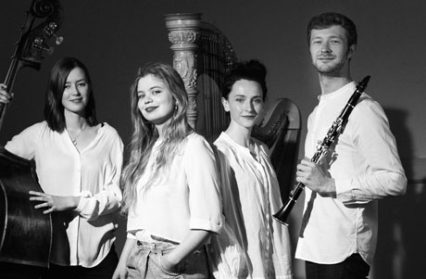Having heard The Hermes Experiment earlier this year in the first St David’s Hall NightMusic series, and very much enjoyed their unique sound combination in a range of contemporary works, I was keen to see and hear them again on a visit to the RWCMD.

As explained by harpist Anne Denholm at the start of this lunchtime concert, The Hermes Experiment deliberately chose a combination of instruments – voice, harp, clarinet and double bass, for which there was no composed repertoire, and offer in concert a mix of new commissions, improvisation and their own arrangements. Their list of commissions currently stands at 56, with new works from Oliver Leith and Errollyn Wallen forthcoming in their 5th birthday concert next January. It’s an impressive record.
The quartet ably demonstrates the variety of ways in which new music can be engaging. They also put the music which they commission into their repertoire. Composers benefit by getting their pieces performed more than once; audiences benefit by getting a chance to get to know new music better than a single hearing permits. In this lunchtime concert, the quartet played some of the pieces included in their NightMusic concert, and it was interesting to hear those again alongside some works new to me.
One of the works getting a second outing in Cardiff was Welsh composer Joseph Davies’s Hymn to Hermes (2018) a commission funded by TŷCerdd, thanks to whom this can also be heard on The Hermes Experiment’s website. Singing in Ancient Greek, soprano and co-director of the quartet Héloïse Werner adds theatricality to the sonorities of this piece. Like the first piece in the concert, Quiet Songs (2014)by Jeremy Thurlow, this music explores the full range of what this unusual combination of instruments can do, though in very different ways. Where Davies’s piece is forceful, Thurlow’s three songs – setting words by the twentieth-century French poet Yves Bonnefoy – are impressionistic, very much in the slipstream of Ravel and Debussy, the music painting what the composer himself calls “a kind of musical watercolour”.
What Thurlow’s songs and Alex Mills’s Samsāra(2018 – premiered in May) have in common is a contemplation on life, the latter specifically focussing on the Buddhist idea of the endless wandering of the soul and played from a graphic score, giving the players freedoms within a loose structure and using the additional resonances of a shaker and Indian cymbals to indicate transitions from, as it were, one life to the next.
Clarinettist Oliver Pashley has arranged Peter Maxwell Davies’ Farewell to Stromness for the quartet in a way that brings out new colours in the music, rather like the changes in a sunset, by turns delicate and striking. The finale of the concert, Anne Denholm’s arrangement of Meredith Monk’s Double Fiesta –originally for voice and two pianos – was a riot of joyful, carnival sound in which Héloïse Werner let rip with her full vocal repertoire.
The Hermes Experiment presented a box of delights in this concert. Emily Hall’s beautiful vignettes I am happy living simply and The end of the ending(2017) were a perfect lead-in to the Meredith Monk arrangement. I loved hearing these again, so tender, and of an apparent simplicity which belies the skills of both composer and performers. With every word clearly audible too. Just superb.
Marianne Schofield on double bass completes this quartet of wonderfully adventurous musicians, co-directed by Hanna Grzeskiewicz. In line with their commitment to work in education, the four players went on to give masterclasses in the RWCMD immediately following their recital. I hope they will have inspired some of the students to think, as they have, of new ensemble combinations and musical experimentation.
St David’s Hall NightMusic Series is on every year but The Hermes Experiment has also been presented at RWCMD.
Cath Barton is an English writer who lives in Wales. Her prize-winning debut novella The Plankton Collector is published by New Welsh Review under their Rarebyte imprint. Cath is on the 2018 Literature Wales Mentoring programme, working on a collection of short stories inspired by the work of Hieronymus Bosch. https://cathbarton.com.


 Enjoyed this article? Support our writers directly by buying them a coffee and clicking this link.
Enjoyed this article? Support our writers directly by buying them a coffee and clicking this link.







